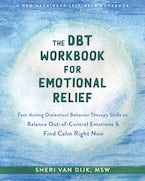When working with clients who struggle with emotion dysregulation, we’re often working with clients who have a history of adverse experiences in childhood, in which case survival strategies such as “numbing out” or disconnecting have often developed. At the time of the trauma, such unconscious defense mechanisms helped them survive; but once the trauma is over, those mechanisms get in the way of building a life worth living. What do we do when this happens in session?
First, help your clients get grounded with strategies like these:
– Tell the client:
“Take a deep breath in and push your big toes into the floor; as you exhale, focus, and push your little toes into the floor.”
– Tell the client:
“Look around the room and tell me five things you see that are red,” or, “Tell me five physical sensations you notice.”
– Have clients hold an ice pack through the session.
– Keep a strong, grounding scent nearby.
– With clients who struggle to stay grounded, we can do constant grounding: throw a pillow or ball back and forth with them as you talk; or have them hold a Slinky, slowly moving it from hand to hand.
Psychoeducation about why the nervous system responds this way will help clients observe and describe their experience without judgment, and start to recognize early warning signs of this defense, such as an increased heart rate; shallow breathing; lightheadedness or dizziness; or objects and people seeming further away or distorted. Using mindfulness, clients can start to notice their early warning signs and then be on the lookout for them; we can help with this by pointing out these signs when we see them in session.
Finally, help clients identify triggers for this response so that we can help them desensitize to these triggers. Disconnecting or “numbing out,” like all target behaviors, serves a purpose; and it’s important to validate this before we move toward change strategies to help clients manage in more effective ways.
Sheri Van Dijk, MSW, is a psychotherapist, and renowned dialectical behavior therapy (DBT) expert. She is author of several books, including Calming the Emotional Storm, Don’t Let Your Emotions Run Your Life for Teens, and The DBT Skills Workbook for Teen Self-Harm. Her books focus on using DBT skills to help people manage their emotions and cultivate lasting well-being. She is also the recipient of the R.O. Jones Award from the Canadian Psychiatric Association.



 2024 Peace Playbook: 3 Tactics to Avoid Clashes with Your Partner
2024 Peace Playbook: 3 Tactics to Avoid Clashes with Your Partner